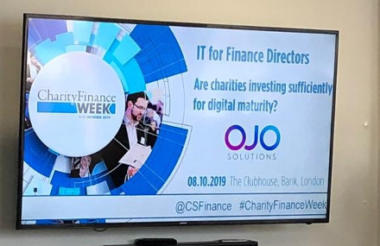Charities of all shapes and sizes are rightly concerned about improving their use of technology, often through digital transformation projects. But this is often left to a traditional IT department without sufficient engagement from other departments, including finance, an audience of charity finance leaders heard yesterday.
Civil Society Media’s half-day event, IT for Finance Directors – Are Charities Investing Sufficiently for Digital Maturity? took place yesterday as part of Charity Finance Week. Delegates heard about the challenges, barriers and solutions to taking the next step when it comes to digital.
In the end, they were told, it comes down to breaking down the silos between departments, and asking the right questions that help to enable meaningful conversations, deepen relationships and focus on outcomes.
Has the finance team created a monster?
Ian Williamson, better projects lead at the Science Museum Group, told the audience that one of the reasons IT teams can be difficult to work with is because they have traditionally reported to the finance team, which has made it harder to be innovative or adopt digital ways of working.
“They worry about the things that keep you up at night,” he said. This being “cost and how not to spend money”, and “risk and how to avoid it”.
“This isn’t anybody’s fault,” he said, but it means that “maybe we have got the IT department we deserve, not necessarily the one we want”.
This manifests itself as IT departments trying to “police” the rest of the workforce, particularly around information security, being perfectionists and building in several layers of protection, and becoming reluctant to upgrade to new technologies.
He said that tech teams need “permission to fail” in order to create a culture for innovation, adding that leaders must demonstrate behaviours they wish to see spread around the charity, because “people will copy what a powerful person does”.
Where is the starting point?
Martin Francis Campbell, chief information officer at World Vision, said that by starting with the tech, charities can find themselves with the wrong solutions.
Instead technology should be looked at as part of the wider activity at the charity and should not be the sole responsibility of the IT team.
He added that as a techie he gets “really nervous about being asked to deliver digital transformation”, but that “as an entrepreneur it is what wakes me up and gets me excited”.
This was echoed by Nathan Baranowski, founder and director at OJO Solutions, who said that while it is important to have specialists, finance leads need to understand what they are asking for when it comes to technology, because “digital transformation cuts across everyone, like HR”.
He said that when there is “common understanding [of what the aim is] then digital just becomes part of the strategy”.
Baranowski also suggested a “five whys” test, whereby if you keep asking “why” after each answer, as a child might do, and “you can get to the fifth why and hold yourself true, then you have a solid understanding of why and how to get to that point”.
Are you asking about results?
Campbell advised delegates to focus on tracking outcomes, instead of actions, and avoid silos.
He suggested a model where people are “accountable for results rather than activity”.
This could help people to understand why one project may need to be put on hold while another one is completed.
He added that accountability is not possible “without counting”, which is where finance professionals could play a key role.
Can you predict the future?
Campbell went on to say that technology enables the collection and analysis of lots of data.
“One of the powerful things about digital transformation is the data available to tell us what has happened and what is going to happen,” he told the audience.
“When I know what has happened, and when I know what is going to happen, I can change it.”
He also said that those organisations doing digital well are outward-facing and looking at the challenges around them to see how they might overcome them, such as finding new ways to engage existing and potential supporters who have higher expectations about charities.
“Organisations that are doing this well are looking at what has changed in the world around us. They are not looking internally,” he said.
Have you got the right people?
Williamson highlighted the challenge that many charity IT departments, in common with the sector more broadly, are not as diverse as they should be.
“If your IT department is a lot of boys and a lot of techies,” he said, “That isn’t multi-disciplinary or diverse enough for the digital era.”
This is because departments need “different life experiences” in order to “to have enough people in the room to say ‘why we are doing it like that’”.
|
Related articles












